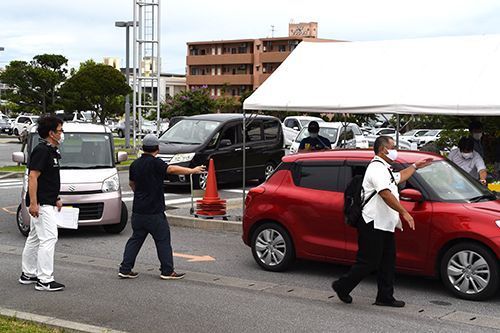Base employees rush to get tested two weeks after cases were confirmed on base, with some calling the testing “too late” and others wanting to quit their jobs

Japanese base workers wait in a long line of cars to receive PCR testing. July 25 at a government office building in Mihara, Okinawa City
July 26, 2020 Ryukyu Shimpo
Fourteen new cases of COVID-19 were confirmed in Okinawa on July 25, the most single-day cases announced by the prefecture so far. Meanwhile, Okinawa prefecture has come to understand that there are a total of 229 cases from U.S. military personnel on the island, surpassing the total in Okinawa of 186. That day, Okinawa began PCR testing for Japanese citizens who work in the U.S. bases, and over 600 people rushed to the testing site to be tested. While there was relief to be had from the testing, the continued spread of the virus throughout the bases has cast a frightening shadow over the workers.
By July 24, Okinawa had contacted the over 800 people who work at Camp Hansen and MCAS Futenma through organization such as the Okinawa Defense Bureau (ODB) for testing. At the testing site, a community center in Okinawa City, people began lining up at 8:00 a.m., well before the official opening time of 10:00 a.m. A woman who works at Camp Hansen, 66, said, hand to her chest, “Being tested is a small relief.”
By 9:30 a.m. the cars of people waiting to be tested were lined up around the block, causing a traffic jam. Okinawa Prefecture made the decision to move the opening time up by 30 minutes, and started inviting people into the testing site. Test recipients were given receptacles to collect saliva, then waited in the parking lot to hand in their samples. After receiving their tests with nervous expressions, people left briskly.
A woman in her seventies who works at MCAS Futenma said of the spread of COVID-19 among U.S. military personnel, “It’s scary. I was thinking of quitting my job. Since I am older, if I caught the disease it is possible it could become serious. Every day I am nervous, and it strains on my spirit,” she said with a fearful expression.
A man in his fifties that works in a cafeteria for soldiers in Camp Hansen, criticized that starting testing two weeks after cases were confirmed on the bases in Okinawa was too late. “They should have started testing earlier, and considered closing down the workplaces. I still interact with a large number of U.S. military personnel in my job, so this won’t alleviate my uneasiness.”
There were also people who arrived before heading into work. Another man in his fifties who works at Hansen said, “I don’t feel sick, however I am worried that I will pass it on to my family or people around me. The U.S. military should strictly limit the movement of their personnel, and take measures to limit their contact with Japanese employees.”
In order to not exclude those who had come for testing when the planned testing time ended at 2:00 p.m., testing continued until around 3:00. A representative from Okinawa said, “It was more than we expected, but we will prepare to see a similar number of people tomorrow.”
(English translation by T&CT and Sam Grieb)
Previous Article:A catch of suku is unloaded at port, energizing Ojima Island in Nanjo
Next Article:Promote Koza’s charms: number of Okinawa City’s tour guides reach 180
[Similar Articles]
- PCR testing in Naha meant to be limited to Matsuyama ends one hour early after an unexpected number of people arrived, causing long lines and traffic congestion
- Residents near U.S. bases ask for PCR testing as coronavirus spreads among U.S military personnel
- U.S. military reports 34 new COVID-19 cases in Okinawa, bringing total count to 99; cluster outbreak among Marines, one case on Kadena
- Okinawa eyes partial shutdown, governor Tamaki calls for prevention measures over New Year’s as Okinawa confirms more coronavirus cases
- “You must get tested before travelling to Okinawa,” declares Governor Tamaki, Naha airport to also provide antigen testing
 Webcam(Kokusai Street)
Webcam(Kokusai Street)


